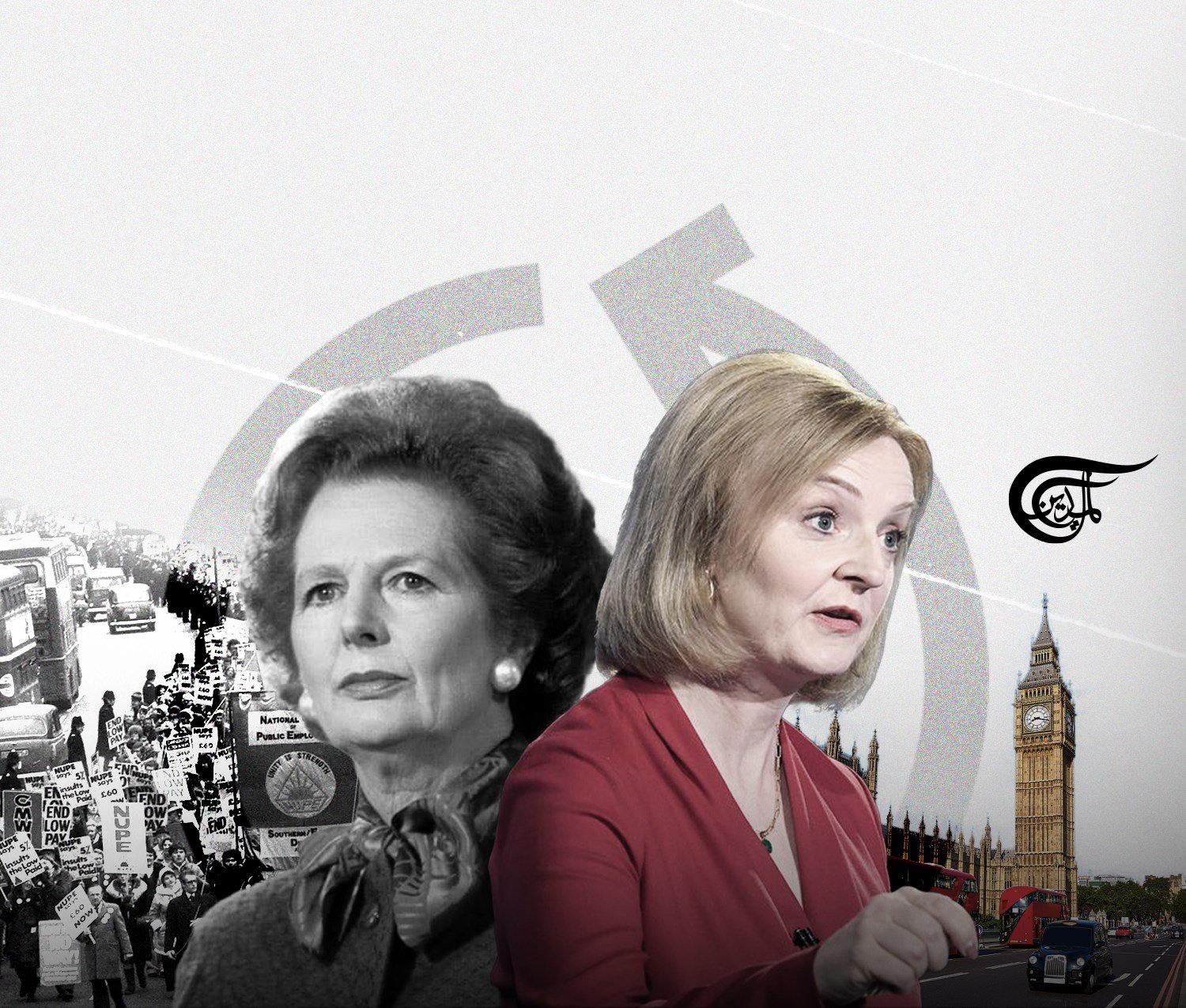Truss vs. Lynch; is this a rerun of Thatcher vs. Scragill?
They say those who do not learn from history are condemned to repeat it. It's 1979 all over. Here we go again.
-

Truss vs. Lynch; is this a rerun of Thatcher vs. Scragill?
In 1979, Britain elected its first-ever female Prime Minister. Margaret Thatcher came to power at a time of national crisis in the United Kingdom. She stood on the doorstep of 10 Downing Street on May 4, 1979, and recited a part of the prayer of St. Francis.
I would just like to remember some words of St. Francis of Assisi, which I think are really just particularly apt at the moment, ‘Where there is discord, may we bring harmony. Where there is error, may we bring truth. Where there is doubt, may we bring faith. And where there is despair, may we bring hope...’
For a country riven by industrial strife, a cost of living catastrophe, and a society desperately needing change, these words were indeed hope, for a better future and a balm to soothe open wounds.
Alas! They were only words, and as a young naive 16-year-old, I was taken in by the electoral system that promises change, while in fact, it only rotates the circus ringmasters between the Conservative and Labour parties in a duopoly of misgovernment. How very hollow indeed those fine words of hope would become.
Margaret Thatcher’s legacy was one of division, deceit, treachery, murder, and the beginning of 40 years of privatization and neo-Liberal austerity.
In 1981, she allowed eight Irish Republican Army volunteers and two Irish National Liberation Army volunteers to die on hunger strike in Long Kesh prison camp known by the British as Her majesty's cellular prison 'The Maze'.
Built as an impregnable, escape-proof modern compound to house convicted republicans who were waging a war of national liberation against Britain’s continued military and colonial occupation of the North East of Ireland, the jail would witness the 'No Wash' protest more commonly referred to as the 'Blanket Protest' and a hunger strike.
When the most recent episode of violence erupted onto the streets of Northern Ireland in 1969, when the nationalist Irish Indigenous people challenged the one-party sectarian pro-British unionist/ protestant regime at Parliament buildings 'Stormont', men and women convicted of indictable offenses were incarcerated in Long Kesh prison camp, alongside thousands who were to be 'interned without trial.'
Having Committed no crime and no evidence being offered before the court, they were simply incarcerated in jail as a form of collective punishment, visited upon the nationalist/Irish community, much as the 'Administrative Detention' used by that other colonial occupying "state", "Israel", visits upon the Indigenous population of Palestine.
In Belfast, these combined prisoners were treated as de facto prisoners of war.
Allowed their own command structure within the jail, training, free association, their own clothes, educational classes, and food were all sent in by family and friends.
This came to an end in 1976 when the new prison 'The Maze' became operational, adjacent to Long Kesh.
A policy of criminalization was introduced as IRA and INLA prisoners were no longer considered freedom fighters and revolutionaries but treated as mere common criminals.
The first IRA prisoner Kieran Nugent, convicted and sentenced to serve his time in 'The Maze', was given a prison uniform.
He refused to wear it.
He famously told the 'screws', prison warders, the only way they could get him to wear the uniform was to 'nail it to his back'.
Badly beaten and thrown into the prison cell virtually naked, he picked up the only item of cloth available, his prison blanket, and thus the 'Blanket Protest’ in 1976 was born.
A song comrades this singular act of bravery with the words: 'I will wear no prison uniform nor meekly serve my time, that England might brand Irelands fight 800 years of crime'.
This Protest eventually led to the demand by the republican prisoners to reintroduce 'political status'.
Ten men died in pursuit of this reality.
They were not common criminals, they were freedom fighters and revolutionaries, 10 of them died in pursuing that recognition
During the hunger strike, Bobby Sands, the first to make the ultimate sacrifice on May 5, 1981, after a hunger strike of 66 days, was elected to the British House of Commons as a member of Parliament representing the constituency of Fermanagh, South Tyrone in the North East of Ireland.
Bobby Sands, a convicted member of the Irish Republican Army and a prisoner of the state, was elected with more votes by his constituents than Margaret Thatcher had as Prime Minister of the country.
That irony was lost on many.
The Iranian government renamed the street which houses the British Consulate in Tehran, Bobby Sands Street.
So embarrassed by this, the British began to use the tradesman entrance at the back of the embassy as the main point of entry.
The British Embassy in Dublin was burnt to the ground and mass street disturbances ensued.
Thatcher refused to negotiate with the prisoners claiming they had chosen suicide over life.
Shortly after the fast ended, all the prisoners' demands were quietly conceded by the prison regime and within two years, 38 republican prisoners escaped together from Europe's most secure prison to reinvigorate the Irish resistance movement.
The prison also held a small number of counter-revolutionary Pro British Death squad members, jailed for the random sectarian murders of unarmed innocent indigenous Irish Catholics.
Not content with murdering 10 Irish hunger strikers and introducing a security force 'shoot to kill policy' against active republicans to include the executions of three Unarmed IRA volunteers in Gibraltar, she consigned 323 Argentine sailors to a watery grave in the freezing cold waters of the Atlantic when she gave the order to HMS Conqueror on May 2, 1982, a British modern nuclear submarine, to sink an old outdated world war two vintage Argentine light cruiser the 'Belgrano' which posed no substantial threat to the British task force charged with reinvading the 'Malvinas', also known by the British as the 'Falklands'.
A small island 8000 miles off the coast of Britain yet a mere 800 miles off the coast of Argentina; an island that only resides in British hands due to the power of its military occupation.
There are more sheep than people on the island but rather than returning it to Argentina, Thatcher went to war.
In Ireland, she murdered the indigenous population.
In The Malvinas, she murdered Argentines, and in Britain, she persecuted the miners and destroyed the trade union movement, which was the backbone of the achievements of the working class in forcing concessions from the bosses and captains of industry, which led to a five-day working week, minimum wage, maternity leave statutory, paid holidays, free education, free health care, and a reasonable standard of living, everything which is anathema to the Conservative party, the party of big business and the corporate classes.
She starved the miners led by Arthur Scargill back to work.
The strike lasted from March 6, 1984, to March 3, 1985.
After one year on strike, without pay, beaten by the police, with six dead, vilified by the press, demonized by the politicians, scapegoated by the government, and betrayed by scab workers who refused to recognize the picket line and took their jobs to appease their paymasters, proud and unbeaten, the National Union of Mineworkers returned to the pits.
No braver fight has been seen since by the working class people of Britain.
They had fought to save their jobs, their communities, their livelihoods, and their job opportunities for coming generations, only to see Thatcher close the pits, decimate their communities, break the trade union movement in the disUnited Kingdom, and enforce draconian anti-trade union laws.
Thatcher’s legacy is one of death, starvation, brutality, and austerity.
In 1979, inflation was running at levels similar to the historic figures we are witnessing today.
In 1979, inflation was over 13%, and by early 2023, inflation in the UK is predicted to be between 18 and 21% with average household energy bills forecast to be around 5 to 6 thousand pounds and food prices going through the roof.
The trade union movement today on behalf of its membership is pushing for inflation-busting pay rises, as energy prices and food costs soar, leaving many in debt and anticipating a harsh winter.
Yet we have a Tory Conservative government in power that may very well elect another female Prime Minister, Liz Truss, who models herself on Margaret Thatcher.
While Margaret Thatcher was known as the 'Iron Lady' and famously quoted the 'ladies not for turning,' Liz Truss could easily find alternative employment as a gymnast, who does so many somersaults and back flips she could be an Olympic champion.
They say those who do not learn from history are condemned to repeat it.
It's 1979 all over. Here we go again.
STRIKE!

 Fra Hughes
Fra Hughes
 8 Min Read
8 Min Read











